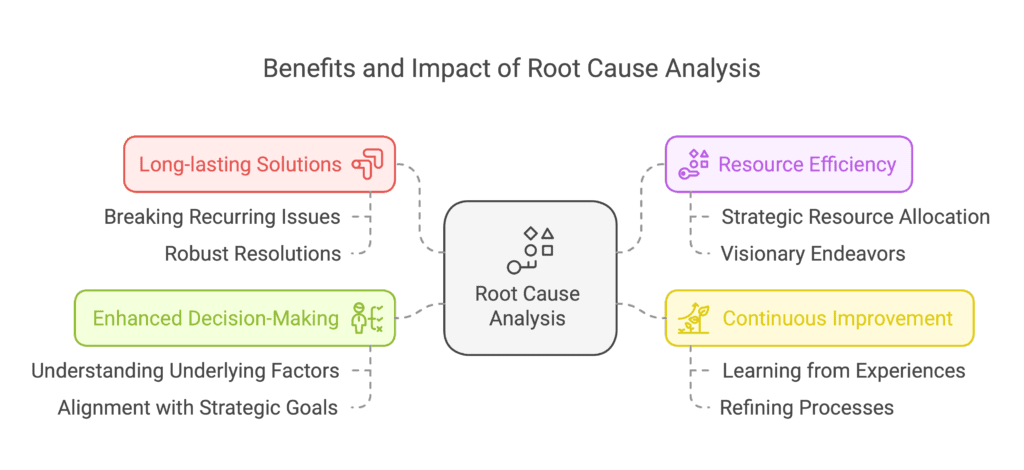In the intricate tapestry of challenges that businesses and individuals face, solutions that merely scratch the surface often fall short of delivering long-term resolutions. This is where the art of Root Cause Analysis (RCA) comes into play. It is not merely a technique; it’s a mindset, a philosophy that empowers us to dig beneath the visible symptoms and uncover the fundamental reasons behind issues.
Understanding Root Cause Analysis
RCA is a systematic approach used to identify the underlying causes of problems, rather than just addressing their apparent manifestations. It aims to uncover the deeper factors that contribute to issues, which, if left unaddressed, can lead to recurring problems. Failure to address these underlying causes may prompt our customers to initiate more serious escalation steps against our organization.
By getting to the root of the matter, organizations can implement more effective solutions that not only resolve the immediate concern but also prevent its recurrence.

The Mindset Shift
Mastering RCA requires a shift in perspective. Instead of simply addressing the symptoms of an issue, individuals and teams need to embrace the role of detectives, seeking clues that will lead them to the origin of the problem. This mindset shift entails a willingness to ask probing questions, challenge assumptions, and think critically about the interconnections between various factors.
The Process of Mastery
To achieve mastery in RCA, one must embark on a journey that encompasses several crucial steps. The process begins with the vital task of gathering information about the specific issue at hand. For this purpose, a control chart and a histogram are most commonly used. A flowchart can also be utilized to provide insights into the process in which the problem occurred.
This entails a comprehensive examination of relevant data, the collection of anecdotal evidence, and engagement with team members who hold direct or indirect stakes in the problem.
Asking the right questions is at the core of effective root cause analysis. Crafted inquiries like “Why did this happen?” and “What factors contributed to this outcome?” serve as the keys to unlocking deeper insights. These questions peel back layers of superficiality to reveal the underlying causes that fuel the issue’s surface appearance.
The utilization of dedicated tools and techniques further refines the RCA process. Approaches like the 5 Whys, Ishikawa Diagrams, and Fault Tree Analysis provide structured frameworks for uncovering potential causes and comprehending the intricate relationships between them. These tools act as guides, steering analysts toward a clearer understanding of the problem’s complexities.
For this reason, we find them in the most popular problem-solving methodologies like: 8D Report, A3 Report or QRQC.
Armed with an in-depth grasp of the root causes, organizations can then enact targeted solutions. These solutions not only address the immediate concern but also proactively prevent its recurrence. This approach reflects the true power of Root Cause Analysis – not merely resolving issues, but altering the landscape to forestall their reemergence.
Benefits of Root Cause Analysis
This analytical step yields a cascade of benefits that resonate throughout an organization. One of the most significant advantages lies in the realm of long-lasting solutions. By dissecting and addressing core problems, organizations can break the cycle of recurring issues. This results in solutions that are not ephemeral fixes but robust and enduring resolutions.
Resource efficiency also takes center stage. Instead of repeatedly allocating resources to combat the same issue, a well-honed RCA approach enables the strategic allocation of resources to more visionary and constructive endeavors. This redirection enhances an organization’s overall efficiency and efficacy.
It’s important to emphasize that RCA isn’t a static process; it fosters a culture of continuous improvement. Teams learn from their experiences, leveraging insights from RCA to refine their processes and approaches. This iterative growth fuels an environment of innovation and adaptability.
Moreover, mastery in RCA enhances decision-making. Armed with a profound understanding of the underlying factors shaping their operations, organizations can make informed decisions that align with their strategic goals. This shift from reactive to proactive decision-making heralds a new era of organizational effectiveness.
In essence, it’s not just about technique; it’s a mindset that empowers organizations to confront challenges with precision and foresight. From its foundational steps to its overarching benefits, RCA mastery guides organizations towards sustained success and innovation.
Conclusion
As we have observed, this is not just a catchy phrase; it encapsulates a transformative approach that empowers individuals and organizations to confront challenges head-on, with an unwavering commitment to understanding the core issues at play.
Dariusz Kowalczyk


